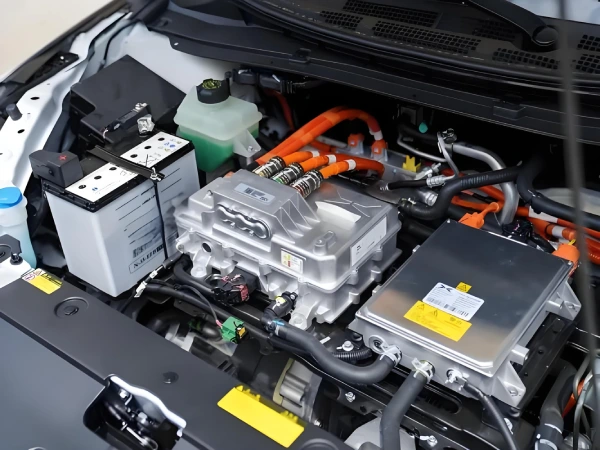The heavier the car battery weight, the greater the mileage will generally be. At the same time, car battery weight will also affect the car’s dynamic performance, suspension, and steering components. Therefore, car battery weight is one of the critical elements that must be balanced in electric vehicle manufacturing.

Part 1. 7 types of car batteries
There are mainly the following types of car batteries
- Lithium-ion battery. Lithium-ion batteries have a higher voltage, usually 3.6V. It has a long service life and high energy density, but the cost is relatively high.
- Ni-MH battery. The positive active material of nickel-metal hydride batteries is nickel hydroxide. The negative active material is metal hydride. The electrolyte is a potassium hydroxide solution. Nickel metal hydride batteries have low cost, mature technology, and long life but have low energy density and large size.
- Lead-acid batteries. The electrodes of lead-acid batteries are mainly made of lead and its oxides. The electrolyte is a sulfuric acid solution with low cost and good low temperature performance. However, lead-acid batteries have low energy density, short life, and large size.
- LiFePo4 battery. LiFePo4 battery uses LiFePo4 as the cathode material. LiFePo4 batteries have good thermal stability, low safety cost, and long life. But its energy density is low, and it fears low temperatures.
- Ternary lithium-ion battery. The cathode material of the ternary lithium-ion battery uses lithium nickel cobalt manganate. It has high energy density, long cycle life and good low temperature stability. But it is not stable enough at high temperatures.
- Nickel-cadmium batteries. The nickel-cadmium battery voltage is 1.2V and has a service life of 500 times. The discharge temperature of nickel-cadmium batteries is -20℃~60℃, and the charging temperature is 0℃~45℃. And it has strong overcharge resistance.
- There are also supercapacitors, lithium cobalt oxide batteries, graphene batteries, etc. Each battery has its unique advantages and disadvantages and is suitable for different automotive applications and needs.
Part 2. Car battery weight composition
Before knowing what affects car battery weight, we need to know the composition of a car battery.
The cost of an automobile battery pack system includes three parts: cell, battery management system, and pack system, including functional components, wiring harnesses, structural parts, and other components. Take Tesla as an example. The battery cost of the earliest Tesla Model accounted for a quarter of the entire vehicle. This makes their electric vehicles expensive.
For lithium-ion power batteries, the basic unit is the cell. The structure of the cell includes:
- Positive electrode: lithium compound.
- Negative electrode: carbon material.
- Electrolyte: non-aqueous liquid electrolyte.
- BMS: Car batteries also include a battery management system (BMS), which monitors the status of the battery to ensure safe performance and the normal range of output power.
Part 3. What affects car battery weight?
Generally speaking, the heavier the car battery weight, the greater the driving distance. At the same time, EV battery weight will also affect the vehicle’s dynamic performance, suspension and steering components, etc. Therefore, EV battery weight is one of the key elements that must be balanced in electric vehicle manufacturing.
Therefore, we can conclude that the following factors determine car battery weight:
1. Car battery types
Car battery weight mainly depends on the type and capacity of the battery. Popular battery types currently on the market include lithium-ion batteries, nickel-cobalt-lithium manganate, and solid-state batteries.
Lithium-ion batteries are the most commonly used battery type due to their high energy density, long life, and low self-discharge rate. However, the disadvantages of lithium-ion batteries are their higher cost and limited capacity. Therefore, a larger battery capacity is needed for a longer cruising range. But this will also make the car battery weight heavier.
2. Car battery capacity
Car battery weight is directly proportional to battery capacity. In other words, the greater the capacity, the greater the weight.
3. Car battery material density
The density of the positive and negative plates of the car battery and the electrolyte will affect the car battery’s weight. Different manufacturers’ density differences in materials will also lead to different car battery weights.
4. Car battery shell structure
The shell structure of the car battery also affects its weight to a certain extent. Some battery manufacturers use stronger casings to protect their batteries. Therefore, these car battery weights tend to be heavier.
5. Car size and weight
The size and weight of an electric vehicle also affect battery weight. For example, the capacity and weight of batteries used in large SUVs and small cars differ.
6. Others
Other factors also affect car battery weight. For example, the charging speed and charging type of electric vehicles, body materials, power systems, etc.
Part 4. Car battery weight
Different car batteries also weigh differently.
- The weight of traditional lead-acid car batteries is usually between 11 kg and 22 kg.
- For electric vehicle batteries, the weight is even heavier. Most are between 250 kg and 450 kg. The exact weight will vary based on battery type and capacity.
- The weight of car batteries will also vary depending on the capacity. For example, a 45Ah battery weighs approximately 12.5 kg. The weight of a 110Ah battery is approximately 24.5Kg. It’s important to note that these figures may vary depending on the specific battery make and model.
Compared with the weight of the engine and gearbox of fuel vehicles, the batteries of electric vehicles are much heavier. Suppose we only use battery cell density to calculate car battery weight. In that case, we can see that car battery weight is a shortcoming of electric vehicles.
Taking an 80kwh battery as an example, the total weight of the battery cells of the ternary lithium battery is 400kg. The total weight of LiFePo4 cells can reach 485 kg.
This is just the weight of the cell. Add the weight of the battery structure outside the cell, such as the battery top/bottom case, insulation layer, CMC, cooling system, and other components. The car battery weight will be even heavier.
Part 5. Summary
In general, the EV battery weight of an electric vehicle directly impacts its performance and cruising range. Automakers need to find a balance between battery weight and performance. In the future, with further upgrades in battery technology, car battery weight will continue to be optimized. Car battery manufacturers will increase the energy density of car batteries and reduce car battery weight without sacrificing car performance and service life.
Related Tags:
More Articles

Overview of Deep Cycle Lithium Battery
In this article, we explore the life, voltage, capacity, and charging considerations of deep cycle lithium batteries.
How Long do Lithium Batteries Last?
How long do lithium batteries last? we will explore the factors that influence the lifespan of lithium batteries and provide insights into their longevity.
How to Choose the Best LiFePO4 Battery?
Choose LiFePO4 batteries for superior performance, safety, and versatility in EVs, UPS, and backup power. This guide helps you make informed decisions.
Get 12v Lithium Car Battery As a Power Source for the Ride
Make the right choice for your vehicle's battery needs by installing a 12 volt lithium car battery. You will enjoy maintenance-free longevity with this change.
Everything About A Small Lithium Ion Battery
Discover the features, uses & future potential of a small lithium ion battery. A compact and tiny powerhouse ideal for smartphones, wearables, drones & more.





